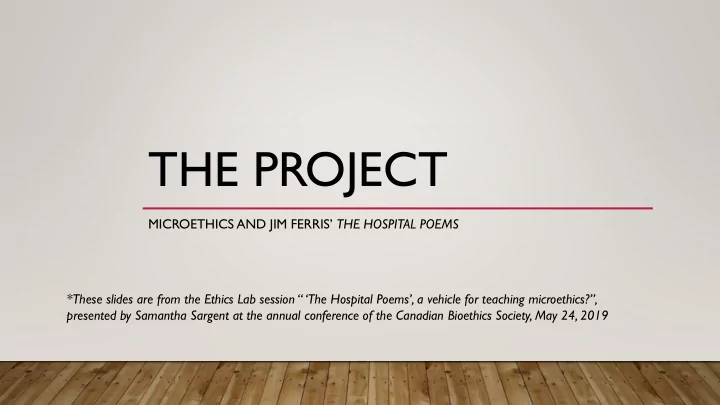

THE PROJECT MICROETHICS AND JIM FERRIS’ THE HOSPITAL POEMS *These slides are from the Ethics Lab session “ ‘The Hospital Poems’, a vehicle for teaching microethics ?”, presented by Samantha Sargent at the annual conference of the Canadian Bioethics Society, May 24, 2019
Microethics • Traditional ethics • Macro • Resource Management • Big Questions • Viewpoint • Outside vs. Inside • Rationality, Representation & Respect • Truth & Truth Telling
Microethics (continued) • “Gestures, Postures, Intonations, Pauses, and Silences” • Word Choice (e.g. “baby” vs. “fetus”) • Interpretation • Hospital everyday for Healthcare workers but usually “pivotal” moment for patients • Routine (Efficiency) vs. Autonomy
How do you as a healthcare worker show your patients that you recognize their experiences and perspectives? Share a story about a time you engaged with a patient’s perspective either in the moment or after the fact
Jim Ferris • Poet and performance artist • Endowed Chair in Disability Studies at the University of Toledo • The Hospital Poems (2004) • Main Street Rag Poetry Award in 2004 • “Memoir in Verse” • “Fixing” – medical and social goals • Pathologization of disability?
The Coliseum • Follows “From the Surgeons”, a list of his medical records from ‘60 - ’70 through repeated surgeries to lengthen his left leg. • These records discuss his adjustment in school, his use of braces and canes, and the atrophy of his muscles • “The Coliseum” shows us (the reader) what it is like to be the subject of one of his surgeries
DISCUSSION: THE COLISEUM • What lines jump out to you? • What language do you notice? • How is the patient positioned in this poem? The healthcare providers? • What non-verbal cues of the healthcare providers is the patient picking up on? • What features of healthcare professionals and their demeanor does the patient highlight through his language choice? • How does this poem make you feel?
Standard Operating Procedure • Follows “The Coliseum” • Shows the operation from the operating physician’s viewpoint as imagined by the patient • Shows how the patient sees the operator
DISCUSSION: STANDARD OPERATING PROCEDURE • What lines jump out to you? • What word choices do you notice? • What is implied about “Standard Operating Procedure” in this poem? • How do we think the patient came to this view of internality of the healthcare provider? What clues might have led them to the conclusions we see here? • How could the operating physician have behaved differently in regards to microethics? • How can might the operating physician have engaged with Ferris to reconcile these two different views of the same event to come to a shared understanding?
WOULD MICROETHICS MAKE A DIFFERENCE? • Recognizing patient experience • Acknowledge patient feelings, assumptions, & fears • Comfort in the clinical setting • Improved relationship with healthcare providers
DISCUSSION: TAKING MICROETHICS HOME • What are some ways you can enhance your engagement with patients through non- verbal communication techniques? • Specifically when dealing with disability, what are some ways you can adjust your language and non- verbal communication away from “fixing” and pathologizing while still providing necessary treatment? • What special attention can you pay to ableist language as a part of microethical engagement?
Works Cited Ferris, J., The Hospital Poems . Charlotte, NC., Main Street Rag Publishing Company, 2004. Frank, A., “Dense Junctures of Ethical Concern” Narrative Inquiry in Bioethics , Vol. 3,1 Spring 2013, p.35-40. Garrie , A., et al., “Medical Students’ Perceptions of Dementia after Participation in Poetry Workshop with People with Dementia,” International Journal of Alzheimer’s Disease , Vol. 2016, 2016, p.1-7. “Jim Ferris.” University of Toledo, 24 January 2018, www.utoledo.edu/al/disability/faculty/ferris-jim.html “Jim Ferris.” Poetry Foundation, 2018, www.poetryfoundation.org/poets/jim -ferris Lindemann, H., “Introduction.” Stories and Their Limits: Narrative Approaches to Bioethics , ed. Hilde Lindemann, New York, Routledge, 1997, p. vii-xx. .
Works Cited (cont) Mandal J., et al., “Microethics in Medical Education and Practice,” Tropical Parasitology. Vol. 5,2, 2015, p.86-87. Scully, J., Disability Bioethics. Maryland, Roman and Littlefield Publishers Inc., 2008. Truog , R., et. al., “Microethics: The Ethics of Everyday Clinical Practice,” Hastings Center Report, Vol. 45,1, 2015, p.11-17 Wolters, F., Wignen- Meijer, M., “The Role of Poetry and Prose in Medical Education: The Pen as Mighty as the Scalpel?” Health Care and the Arts, Vol. 1,1, March 2012, p.43- 50.
Recommend
More recommend